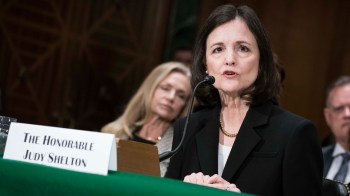Jeremy Hobson: Mitt Romney is one step closer to being the Republican presidential nominee this morning after beating his opponents by double digits in yesterday’s Illinois primary. Romney put his business background front and center as he campaigned in Illinois, and as he claimed victory last night.
Mitt Romney: Our economic freedom will be on the ballot. I’m offering a real choice, and a new beginning. I’m running for president because I have the experience and the vision to get us out of this mess.
Joining us now to talk about Mitt Romney’s economic experience is Benjamin Wallace-Wells. He’s a contributing editor at New York Magazine, who wrote an extensive profile of Romney’s business background. Good morning.
Benjamin Wallace-Wells: Good morning.
Hobson: Let’s start with Mitt Romney’s time at Bain Capital. How would you describe Mitt Romney as a businessman, and what drives him?
Wallace-Wells: Mitt Romney is a deeply, deeply analytic figure. He’s somebody who when you talk to his business associates, they praise him as somebody who is aggressive about reform, as somebody who brought this kind of idealized Harvard Business School consultant perspective to private equity.
Hobson: You call him a “perfectly objective efficiency machine.” What do you mean by that?
Wallace-Wells: Look, from early in the 1980s, what private equity did is it brought a really, very vigorous focus on efficiency. Romney was not only one of the first figures in making that the habit of private equity and then the habit of American business, he also personified it. And so in each one of his business transactions, when you talk to the other folks who are involved in it, you see just this single-minded, vigorous focus on returning shareholder value, on making companies more efficient.
And there are those that credit him for this and say when you look at the trajectory of the corporation over the last 30 years, what you have now is a far more ruthless machine, and in part that’s due to the innovations that Romney and others like him promulgated in the early 1980s.
Hobson: What about this impression that’s out there that Mitt Romney is not like the rest of the us? That he has friends who own sports teams, or that his wife drives a couple of Cadillacs? Does Mitt Romney have any friends who aren’t rich?
Wallace-Wells: He has friends that claim he at least seems natural when hanging out with friends who are not wealthy. But I think there’s a much bigger issue here — Romney believes in a meritocracy. He thinks that those who are rich, are rich mostly because they’ve earned it. What he’s looking at when he looks at his friends, it’s not people who the owners of the Boston Celtics — which was one of his early partners at Bain Capital — it’s people who are there because they are successful, because they are smart, because they earned it.
And you know, there’s no question that’s more foundational in this election than whether the American meritocracy is still working. And one of the things that you see not only in Romney’s proposals, but also in his personal life, is just this commitment to the idea that it is.
Hobson: Benjamin Wallace-Wells is a contributing editor at New York Magazine. Thanks so much for talking with us.
Wallace-Wells: I really enjoyed it.
Hobson: And you can hear our conversations about all the Republican presidential candidates here.
There’s a lot happening in the world. Through it all, Marketplace is here for you.
You rely on Marketplace to break down the world’s events and tell you how it affects you in a fact-based, approachable way. We rely on your financial support to keep making that possible.
Your donation today powers the independent journalism that you rely on. For just $5/month, you can help sustain Marketplace so we can keep reporting on the things that matter to you.


















